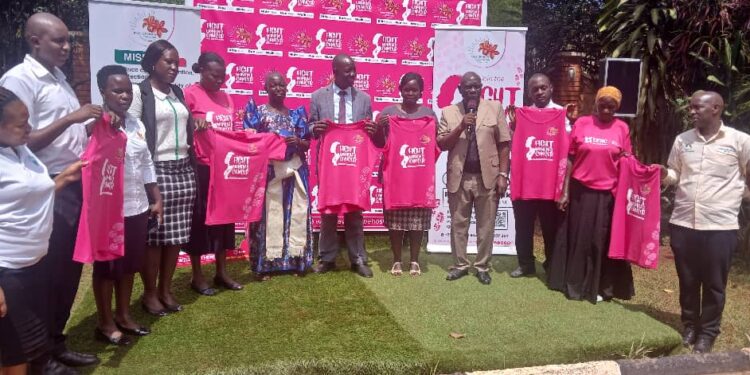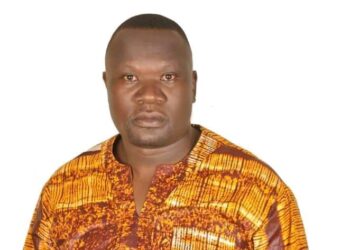On Monday 6th October, 2025 cancer patients(women), managers and staff of Rays of Hope Hospice Jinja (RHHJ), stakeholders including health professionals and the media, among others assembled to officially launch the October Cancer Month which has a series of activities that will climax with a Cancer Run on Saturday 25th October,2025.
According to Madam Sylvia Nakami, the Executive Director RHHJ, every month of October since 2018, the organization launches its annual campaign for breast and cervical cancer awareness campaign.
The theme for this year’s Rays of Hope Hospice Jinja’s Cancer Run is “Fight Women’s Cancer Because Every Woman Matters “and it aims to raise 150Million to support awareness, prevention and management of women’s cancer.
The name of the Chief Runner/Walker or Biker was not disclosed to the media but familiar sources say top managers of the organization are still debating on the choice at a time when the political temperature in the region and country is at its boiling point.
Last year the Chief Walker was the Third Deputy Prime Minister and Mayuge district Woman MP Rt Hon Hajjat Rukia Isanga Nakadama who alongside others are already on the campaign train to defend their positions ahead of 2026 general elections.
The funds raised from the Run will facilitate vaccination of 3,000 girls against is Human Papillomavirus (HPV) and screening for more than 10,000 women in the Busoga sub region which has been described as the ‘pathology of all diseases’ implying the region experiences a high burden of various diseases almost as if it is a hub or epicenter of disease pathology.
Ms Nakami told the audience which also included bikers that the initiative targets communities and stakeholders through media programmes, educational materials and free screenings.
She noted with concern that many women lack access to regular cancer screening, particularly in rural areas where healthcare facilities are scarce.
It should be noted that in Uganda 72% of the population lives in rural areas making it difficult for women to access screening services.
“…As the Bible warns, ‘my people perish for lack of knowledge (Hosea 4:6), Nakami says many women are dying due to a lack of adequate information and knowledge about cervical and breast cancer…”, she cautions.
The text stresses the importance of knowing God and His ways. In the context of Prophet Hosea, the people of Israel had turned away from God and were suffering the consequences of their actions. The ‘knowledge’ referred to in this verse is not just intellectual knowledge but a deep, relational understanding of Gods character and will.
In the context of this news article, this verse takes an evocative meaning, arguing that many women in the region are dying from preventable diseases like cervical cancer due to a lack of knowledge about the disease, its causes and its prevention.
Ms Nakami also notes that some individuals and communities mistakenly seek help from herbalists and traditional healers believing their symptoms are caused by spells or witchcraft.
This misconception can lead to delayed diagnosis and treatment of cervical and breast cancer ultimately worsening health outcomes.
The function was presided over by Dr Alfred Jatho the head of Community Services at the Uganda Cancer Institute (UCI) who says the government of Uganda through UCI is pursuing a multi-faceted approach in handling cancer which he describes as one of the most difficult diseases globally.
Top on the list of government interventions HPV vaccination programme in which the government aims to vaccinate 90%of girls with the HPV vaccine by the age of 13 as part of World Health Organization (WHO’s 90-70-90 targets.
He also says UCI in collaboration with partners like the Foundation for International Healthcare (KOFIH) has established screening centers in regional referral hospitals and lower-level health facilities to increase access to cervical cancer screening.
KOFIH has donated cancer screening equipment valued at 400M shillings to UCI and provided training to health workers. The partnership between KOFIH and UCI is part of a larger project worth 3MUSD which will run for three years, focusing on cervical cancer as a pilot phase which started in the Busoga sub region..
Dr Jatho also told the gathering that the government through the ministry of health and UCI are conducting awareness campaigns to educate the public about cervical cancer, its risks and the importance of screening.
He says as part of early detection and treatment, UCI provides screening services including Pap smear tests DNA testing, Visual Inspection with Acetic Acid (VIA) and colposcopy to detect cervical cancer early to provide treatment.
Breast cancer is the top killer disease among women, accounting for close to 30% of cancers in women and slightly more than 17% of cancer deaths in women whereas cervical cancer accounts for 2.6% of cancers in women and 2.8% of cancer deaths in women.
What You Need To Know:
According to global statistics, cervical cancer is the fourth most common cancer in women with around 660,000 new cases and 350,000 deaths in 2022.
According to Uganda Cancer Institute (UCI), cervical cancer is the top killer among females accounting for 20% of all registered cancer cases in the country with approximately 7,000 new cases each year out of 36,000 cancer cases.
The disease contributes to 40% of all cancers among women in Uganda, making it the most common cancer in the country.
October is the month where we conduct accelerated awareness about breast cancer for the purpose of raising more resources engaging policy makers so that they are able to improve funding.
He also debunked the misconception among some communities that the HPVV vaccine could be a ploy by the government as a birth control measure to check on Uganda’s population.
“…this is not true so the journalists who are here and outside should share accurate and authentic information so that the population understands this very well and avoid falling prey…”, he appealed to the media.
Dr Jatho has been a Principal Investigator (PI)and Co-Principal Investigator (Co-PI) in several cancer prevention studies.
He has been responsible for designing, conducting and managing research studies focused on cancer prevention and early detection. He oversees the entire project, ensuring it meets its objectives and milestones.
This demonstrates Dr Alfred Jatho’s expertise and leadership in cancer research in cancer prevention investigating strategies to prevent cancer such as HPV vaccination and screening programmes as well as early detection by developing and evaluating methods for early cancer detection, improving treatment outcomes and patient survival rates.
Do you have a story in your community or an opinion to share with us: Email us at editorial@watchdoguganda.com














